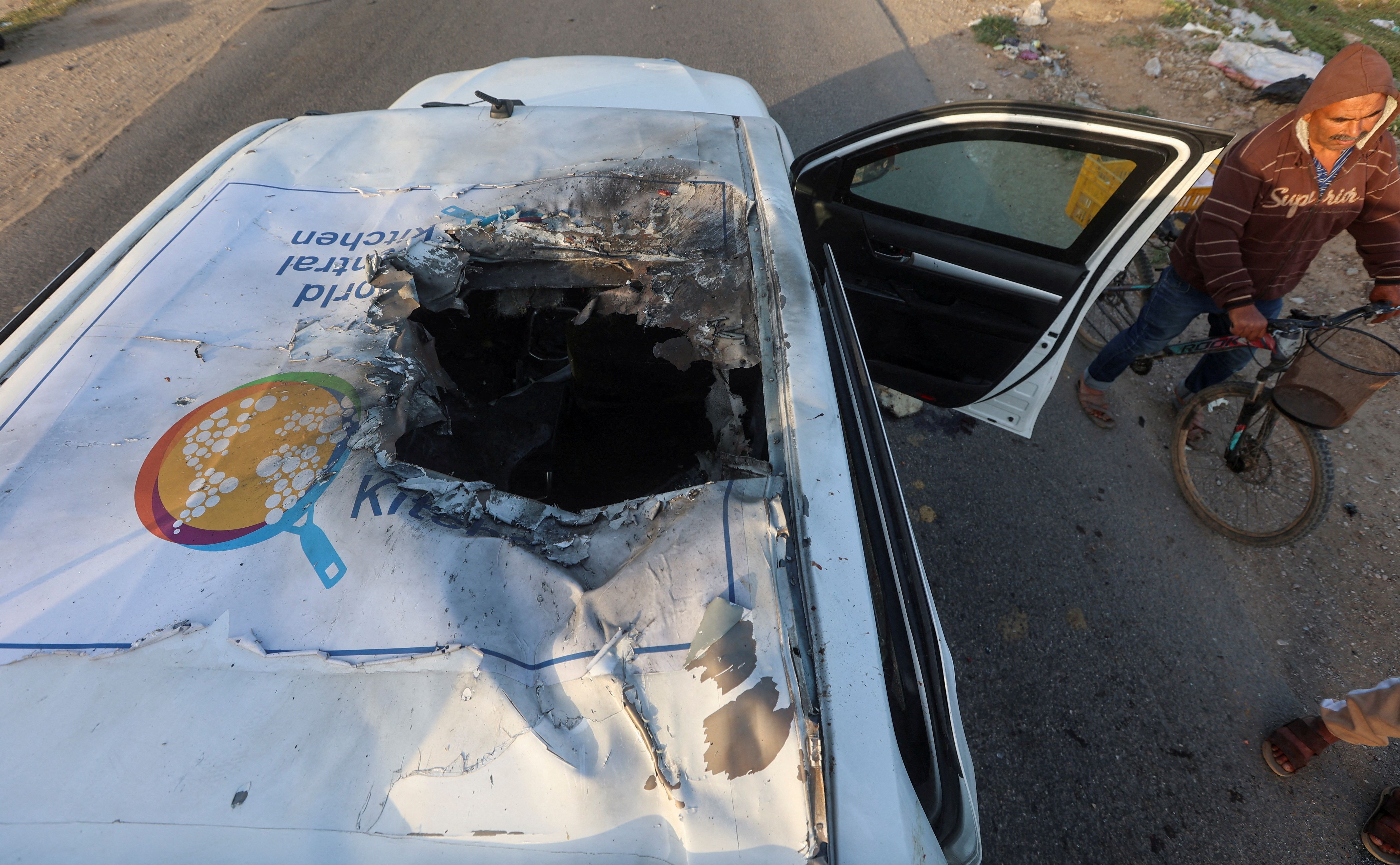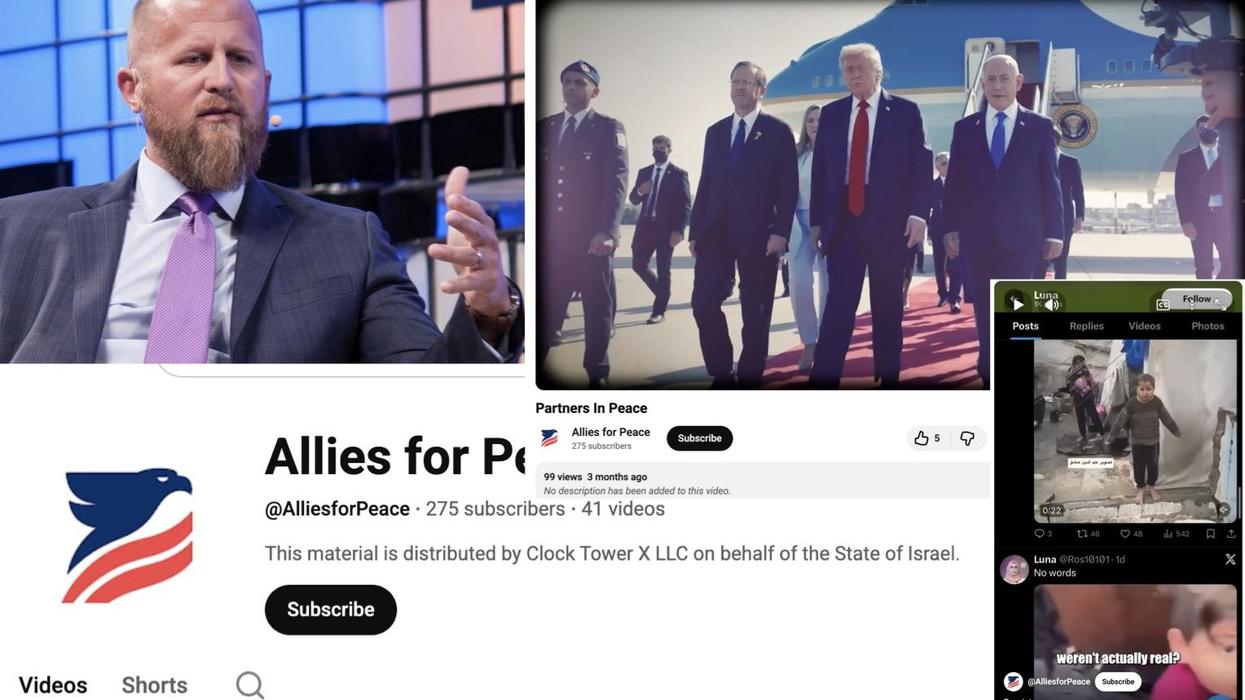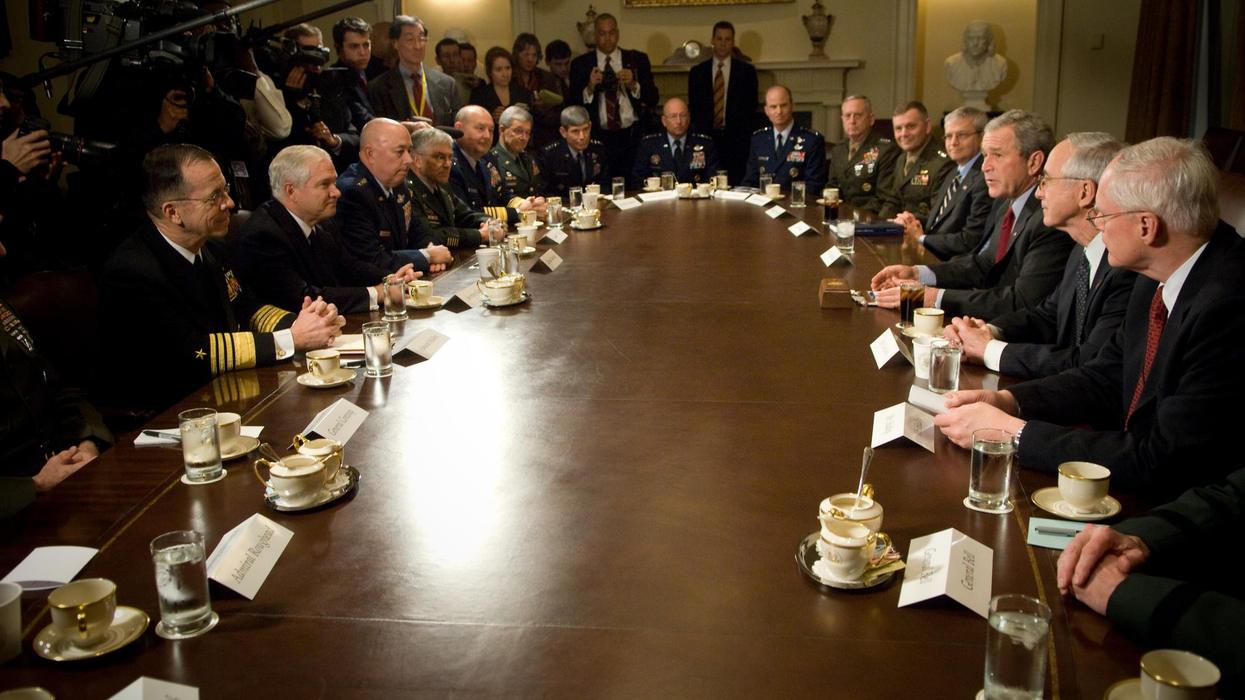Despite a meticulous process in place to ensure aid worker safety in Gaza, the leading cause of death in the humanitarian sector over the last 11 months has been Israeli airstrikes.
Of the 378 aid workers killed worldwide since October 7, more than 75 percent have been killed in Gaza or the West Bank, according to the Aid Worker Security Database. The number of humanitarians killed in Palestinian territory in the last three months of 2023 was more than the deadliest full year ever recorded for aid workers.
This includes an Israeli airstrike Wednesday Sept. 11 on a school being used as a shelter in Nuseirat in Central Gaza. According to reports, 18 were killed, including children and six UNRWA aid workers, the deadliest single event for that organization since the start of the war.

Israeli attacks on aid organizations have become routine, despite systems in place to avoid humanitarian deaths. Through a process called deconfliction, aid groups coordinate with warring parties to avoid being attacked. Popular deconfliction mechanisms used by aid groups in Gaza include clearly marking their assets, arranging their movements with Israeli authorities, and sharing their location with the Israeli military.
However, a disturbing pattern has emerged: Aid groups share their coordinates with Israeli authorities and then are attacked by the IDF at those same coordinates.
Christopher Lockyear, Secretary General of Médecins Sans Frontières/Doctors Without Borders (MSF), told the United Nations Security Council in February that “this pattern of attacks is either intentional or indicative of reckless incompetence.” Forty-eight hours earlier, a 120mm Israeli tank shell exploded in a MSF facility in Khan Younis, killing two people and severely injuring six others. It was the second time a MSF facility had been attacked by Israeli forces.
The White House is aware of this trend. In May, a Biden administration report to Congress noted the following:
"One specific area of concern is the impact of Israel’s military operations on humanitarian actors. Despite regular engagement from humanitarian actors and repeated USG interventions with Israeli officials on deconfliction/coordination procedures, the IDF has struck humanitarian workers and facilities. While Israel repeatedly committed to improve deconfliction and implemented some additional measures, those changes did not fully prevent subsequent strikes involving humanitarian workers and facilities.”
“Concern” might be too strong a word to express the White House’s interest in preventing humanitarian deaths. The same day successive Israeli precision drone strikes killed seven aid workers, including one American citizen, from World Central Kitchen — a humanitarian group founded by Chef José Andrés — Biden approved the transfer of over 2,000 bombs to Israel.
Humanitarian organizations can be based in a Western country (including one upon which Israel relies for weapons), have a direct line to the IDF, follow all deconfliction procedures to a T, and still be attacked by the IDF. And when they have been, the Biden administration has done nothing but issue words of concern from the briefing podium. This lesson is not lost on aid workers: After a nurse from Project Hope was killed by an Israeli airstrike in March, the organization’s director of emergency response and preparedness asked his staff if they wanted to start sleeping in a zone deconflicted with Israeli authorities. All of the staff members said no.
What follows is a non-exhaustive list of 14 Israeli attacks on known aid worker locations compiled from media reports, organizational statements, and independent investigations. Reporting by the New York Times and Human Rights Watch was especially valuable. In each case, the aid groups had notified Israeli authorities of their location and movements, their vehicles or facilities were clearly marked as humanitarians, and were often operating in Israeli-designated “safe zones,” but they were attacked anyway by Israeli forces.
The Biden administration held Israel to account for zero of these 14 incidents.
Fourteen times aid groups were attacked after giving the IDF their location
November 18, 2023: Israeli forces attacked a convoy of five clearly-marked MSF vehicles, killing two MSF staff members. MSF had coordinated the convoy’s movement with Israeli authorities and followed the route prescribed by the Israeli military. MSF staff members saw no military targets in the area when they were attacked. MSF requested an explanation from the IDF but received no response.
December 8, 2023: The Israeli Navy fired at facilities affiliated with the United Nations Relief and Works Agency for Palestinian Refugees (UNRWA) in Rafah with 20mm cannon rounds, damaging the west side of the two buildings. UNRWA officials had repeatedly shared the coordinates of the buildings with Israeli officials, including on the same day of the attack. Agency staff told Human Rights Watch that they were unaware of any military targets in the area. Afterwards, the Israeli military said the attack was carried out by mistake.
December 16, 2023: An IDF tank fired several rounds at the Convent of the Sisters of Mother Teresa (Missionaries of Charity), part of the Holy Family Catholic Parish compound in Gaza. The attack displaced the 54 disabled people sheltering there, leaving some without the respirators “that some of them need to survive,” the Latin Patriarchate of Jerusalem said in a statement.
An aid worker was reportedly injured in the attack. Later that day, an Israeli sniper killed two women sheltering at the church, shooting one woman as she tried to carry the other to safety. When others in the church ran toward the women, Israeli snipers shot them too, wounding several, including two children. Pope Francis condemned the attack, calling it “terrorism.”
Emails between Catholic Relief Services and U.S. Senate staff obtained by Politico show that Catholic Relief Services (one of the largest Christian aid organizations operating in Gaza) had provided the coordinates of the two buildings to Senate staffers, who then relayed that information to the IDF. The IDF confirmed the location of the buildings that Catholic Relief Services requested for protection. The aid group also provided aerial photos of the facilities directly to Israeli authorities. The Latin Patriarchate of Jerusalem Church said they shared their GPS coordinates with the IDF several times before the attack.
December 28, 2023: A convoy of U.N. aid vehicles were shot at by Israeli forces in central Gaza as it was returning from delivering aid in the north. The vehicles were clearly-marked with U.N. insignia, traveling along a route designated by the Israeli military and had coordinated its plans with Israeli authorities beforehand.
January 8, 2024: An Israeli tank fired at a clearly-marked MSF shelter in Khan Younis housing more than 100 staff and their family members, killing a five-year-old girl. MSF had previously notified the IDF of the shelter’s location. Israeli forces denied that they fired a round at the shelter, but remnants of an Israeli-made tank shell were discovered right outside the building.
January 18, 2024: An Israeli airstrike struck a residential compound housing staff from the International Rescue Committee (IRC) and Medical Aid for Palestinians (MAP) in Al-Mawasi, an Israeli-designated safe zone. The blast injured several workers and severely damaged the building. As a result, six emergency medical workers had to leave their posts, and IRC and MAP surgeons suspended their work at Nasser hospital. Forensic evidence suggests the munition used in the attack was a U.S.-made 1,000-pound MK-83 bomb, reportedly dropped by a U.S.-made F-16 aircraft. British officials had used high-level diplomatic channels to ensure the compound was deconflicted with the IDF. A month before the strike, the Israeli military explicitly reassured aid staff through text messages that they were safe. “We’re aware of the location” of the compound, a message from an IDF official read. The MAP employee then clarified whether the building is still safe. “Yes,” replied the IDF official.
Israel provided six different — and often conflicting — explanations for the attack. It said it wasn’t operating in the area; it said it was attempting to hit a target next to the MAP-IRC compound; it said it wasn’t actually a bomb but a piece of the aircraft fuselage. The IDF told The New York Times that they didn’t strike the location at all.
January 31, 2024: Israeli forces bombed the offices of the Belgian development agency, Enabel, completely destroying the building. Handicap International, an NGO, had offices in the same structure. Belgian Foreign Minister Hadja Lahbib said that Israeli authorities “knew very well that Enabel’s offices were located in this building.” Earlier that day, the Belgian government announced it would not suspend funding for UNRWA, after the Israeli government claimed without evidence that UNRWA staff had participated in the October 7 massacre.
In mid-February, Israeli forces claimed it had not bombed the Enabel building, but that it was destroyed when they blew up the building next door for an unspecified military reason.
February 5, 2024: Israeli ships shelled a clearly-marked UNRWA convoy, damaging one of the aid trucks. The convoy was stopped at an Israeli-designated holding point when it was shelled. UNRWA had coordinated the convoy’s movement with Israeli authorities. As a result of the attack, UNRWA had to pause its operations in northern Gaza for nearly three weeks, affecting 200,000 people. Israeli authorities later acknowledged the attack and said it had put in place “prevention measures” to prevent another incident. The next month, the Israeli government blocked UNRWA from providing any food assistance to northern Gaza.
February 20, 2024: Two family members of MSF staff were killed when an Israeli tank fired a shell at a MSF shelter. Seven others, mostly women and children, were injured. A large MSF flag was clearly visible on the side of the building. Israeli forces provided MSF with no warning before the attack and no explanation afterwards.
March 9, 2024: An Anera employee was killed in his home along with his six-year-old son and several neighbors in an Israeli airstrike. The building was registered with the Israeli military as a “sensitive site.” Email records show that Anera had repeatedly shared coordinates and photos of the staff shelter with the IDF, including days before the strike. A precision-guided munition was likely used in the attack.
April 1, 2024: Multiple precision Israeli drone strikes on a World Central Kitchen (WCK) convoy killed seven aid workers, including an American citizen. The Washington, DC-based group had coordinated its route with the IDF beforehand. The vehicles were struck in a deconfliction zone controlled by the Israeli military. WCK founder José Andrés said Israeli forces targeted his colleagues “systematically, car by car.” Forensic evidence backs up Andrés’s claim. “This was not just a bad luck situation where ‘oops’ we dropped the bomb in the wrong place,” Andrés said, pointing to the fact that it was clearly-marked humanitarian convoy with colorful WCK logos on the vehicle roofs, and the 1.8 kilometer distance between the first and the third car in the convoy, each. It was “very clear who we are and what we do,” he added.
IDF Spokesman Danial Hagari said WCK had “coordinated everything correctly with the IDF in advance” and blamed “internal failures.” President Joe Biden said he was “outraged and heartbroken” by the deaths, and called on Israel to investigate itself. But for WCK’s founder, “The IDF cannot credibly investigate its own failure,” Andrés said.
April 9, 2024: A clearly-marked UNICEF aid truck was reportedly hit by Israeli gunfire south of the Salah Al-Din checkpoint. The vehicle was at a holding point when it was struck by several bullets coming from the direction of the Israeli checkpoint. The IDF had approved the convoy beforehand. The Israeli military denied that its troops had fired the shots.
August 27, 2024: A U.N. World Food Programme (WFP) convoy came under fire near an Israeli checkpoint at the Wadi Gaza bridge. As the vehicles approached the checkpoint after receiving multiple clearances to proceed, Israeli troops opened fire, hitting one WFP vehicle at least ten times. Several bullets struck the vehicle’s windows, just above the clearly-visible U.N. insignia and WFP logo emblazoned on the side doors. Israeli officials blamed a “communication error” for the attack.
August 29, 2024: An Israeli airstrike on an Anera aid convoy killed four Palestinians as it was en route to the Emirati Red Crescent Hospital. The route was coordinated and approved by Israeli authorities. Israeli officials claim the lead car the IDF struck was carrying many weapons, but there was no indication that weapons were present. The IDF provided Anera no warning before carrying out the attack.
- Gaza breakdown: 20 times Israel used US arms in likely war crimes ›
- Get out of the way: Israel fires, injures UN peacekeepers | Responsible Statecraft ›
- Netanyahu: Thank you America for your service | Responsible Statecraft ›
- US, UN question Israel ban on aid org helping Palestinians | Responsible Statecraft ›
- Israeli ethnic cleansing nears completion in northern Gaza | Responsible Statecraft ›
- How Israelis admit to war crimes in Gaza without saying it | Responsible Statecraft ›

















